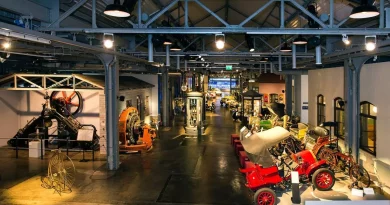Paris-Padua-Evora: Erasmus Mundus TPTI scholarships zur Industriekultur
“This message is to inform you that the campaign to apply to Erasmus Mundus Master „Techniques, Heritage, Territories of industry“ (TPTI) scholarships and research fellowships starts. This program could be interesting for colleagues or students…
The graduate program, coordinated by the University Paris 1 Panthéon-Sorbonne (France) in collaboration with the University of Padua (Italy) and the University of Evora (Portugal), provides scholarships for:
– visiting scholars for a duration of 4-6 weeks (non european researchers)
– students with a bechelor’s level.
We get students and visiting researchers, who perform in technology of different fields: history, architecture, archaeology, art, crafts, industry, etc. and the heritage of these techniques.
You will find all the informations (in French and English) on the website : https://www.tpti.eu/fr/
The deadline to apply is February 1st, 2019 (for students, who want apply without scholarship, the deadline is June 30, 2019).
The Master Erasmus Mundus TPTI is a two year international graduate program coordinated by the University Paris 1 Panthéon-Sorbonne (France) and offering a joint degree with the University of Padua (Italy) and the University of Evora (Portugal). It is open to students from worldwide. The generous scholarship covers the registration in three universities, the travel and installation costs, the expenses of stay. The main language of instruction is French, the secondary language English.
The programme may be of interest to students working on French, Italian or Portuguese study project. It may also be an opportunity to elaborate new academic work and collaborations, including comparative approaches with their countries of origin.
The submission of applications (students and visiting scholars) is done on the online registration platform. The deadline to apply the Erasmus Mundus TPTI scholarships is February 1st, 2019.
Best regards,
Valerie Nègre
Université Paris 1 Panthéon Sorbonne
Allgemeine Information:
Erasmus Mundus Joint Master Degrees
Techniques, Heritage, Territories of Industry (TPTI)
The Master Erasmus Mundus Techniques, Heritage, Territories of Industry is a two year international graduate program coordinated by the University Paris 1 Panthéon-Sorbonne (France) and offering a joint degree with the University of Padua (Italy) and the University of Evora (Portugal).
This graduate program focuses on the history of technology and technological heritage relating to objects, buildings, urban planning, and landscapes. It is intented for both students and professionals who want to deepen their knowledge in these fields of study, either to move forward with a career of teaching or research, or to work within the cultural sector (museum studies, management of cultural institutional heritag and cultural mediation between communities and government on both a national and international level).
During the first semester, the Department of History at the Sorbonne (Paris), offers an high level program centered around the history and the anthropology of technology. During the second semester, students will move to Padua, where courses are focused on the heritage of industry. The third semester takes place in Evora and focuses on the study of cultural and technical landscapes. For the fourth semester, students return to one of the three universities, based on the focus of their research topic. Also included is the option for a research period of up to five weeks in one of the five partner universities located both inside and outside of Europe: Spain, Czech Republic, Tunisia, Mexico, or Brazil.
The richness and strength of this Master Degree lies in the interdisciplinary nature of the program. It combines history, anthropology, archeology, art history, sociology, conservation, and museum studies, as well as a diverse supervising team of both research professors and scientific practitioners connected with culture and heritage. Another important quality is to bring together institutions, scholars and students, coming from all over Europe, Latin America, Africa, and Asia with the goal of illuminating the variety of ways in which History of Technology, Industrial Heritage, Cultural Heritage are addressed around the globe.
The first language of instruction is in French, and the second is in English. French, Italian, Portuguese and English courses are also offered throughout the program.

